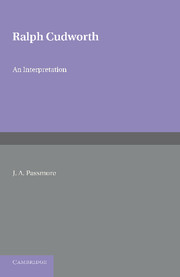Book contents
- Frontmatter
- Contents
- Preface
- Abbreviations
- CHAPTER I Cudworth and his Predecessors
- CHAPTER II Cudworth on Mind and Nature
- CHAPTER III Cudworth's Theory of Knowledge
- CHAPTER IV ‘Eternal and Immutable Morality’
- CHAPTER V Cudworth's Moral Psychology
- CHAPTER VI The Good Life
- CHAPTER VII Ethics and Religion
- CHAPTER VIII Cudworth and the British Moralists
- Appendix: The Cudworth Manuscripts
- A Cudworth Bibliography
- Index of Names
CHAPTER VII - Ethics and Religion
Published online by Cambridge University Press: 05 June 2016
- Frontmatter
- Contents
- Preface
- Abbreviations
- CHAPTER I Cudworth and his Predecessors
- CHAPTER II Cudworth on Mind and Nature
- CHAPTER III Cudworth's Theory of Knowledge
- CHAPTER IV ‘Eternal and Immutable Morality’
- CHAPTER V Cudworth's Moral Psychology
- CHAPTER VI The Good Life
- CHAPTER VII Ethics and Religion
- CHAPTER VIII Cudworth and the British Moralists
- Appendix: The Cudworth Manuscripts
- A Cudworth Bibliography
- Index of Names
Summary
Cudworth's ethics sets out to be humanistic without ceasing to be Christian. It is penetrated by religion without being in the classical sense ‘a theological ethics’. Within it, we feel a certain tension, an uneasy consciousness that there is still a gap to be bridged, a reconciliation to be affected; and only through a study of that tension can we come quite to appreciate the detail of Cudworth's ethics or understand just what place it occupies in the history of British ethical theory.
Cudworth's personal role in the troubled religious controversies of the period is not altogether clear and unambiguous. The Cambridge Platonists are often accused of quietism, of finding in the ideal of the ‘contemplative life’ a retreat from the violent political and religious life of their own time; this may have been true of More and Whichcote, but it was not true of Cudworth. Lady Masham, Cudworth's daughter, attacks those who think ‘the duties of social life to be low matters, fit only to exercise the young Christian, not yet advanced to the spiritual state’, and in this, as in so much else, she was her father's daughter. Concern for ‘the good of the system’, ‘public-spiritedness’, these were virtues Cudworth particularly emphasized. He was extremely active in the affairs of his own college—a delicate and arduous business in those days of political and religious controversy—and this was by no means the limit of his political activities.
Under Charles I, he was a marked man, even amongst the Platonists, on account of the peculiar vigour of his reaction against ecclesiasticism. This we know from Burnet, who, writing of the Cambridge Platonists, singles out Cudworth as ‘being in a cloud as favouring the Nonconformists’. His allegiance to an unpopular cause did not go unrewarded after the Civil War. When the Parliamentary Visitors ejected the Master of Clare Hall, Cudworth was chosen Master in his place; it fell to him to advise Thurloe, then Secretary of State, on the choice of Cambridge young men for government employment; and it was certainly a signal mark of honour to be chosen to preach before the House of Commons.
Yet Cudworth greeted the Restoration with a set of congratulatory verses addressed to Charles II; nor was he removed from his mastership, although he was a man who made bitter enemies.
- Type
- Chapter
- Information
- Ralph Cudworth , pp. 79 - 89Publisher: Cambridge University PressPrint publication year: 2013



